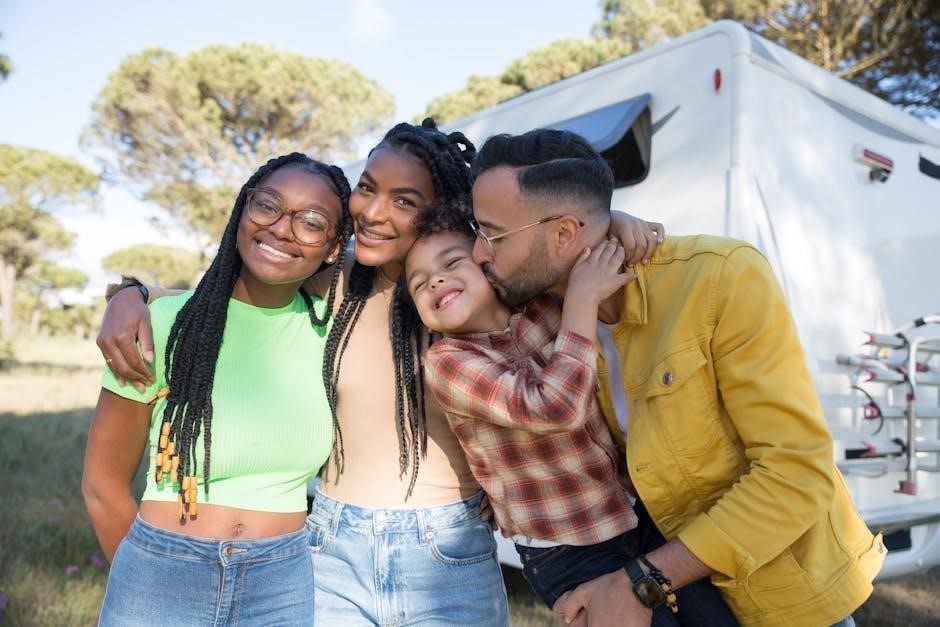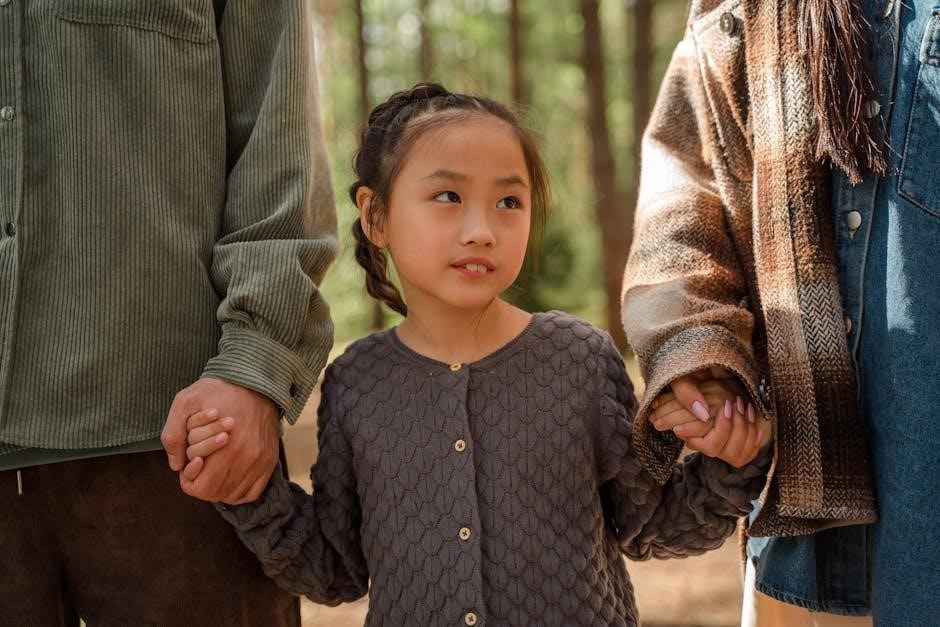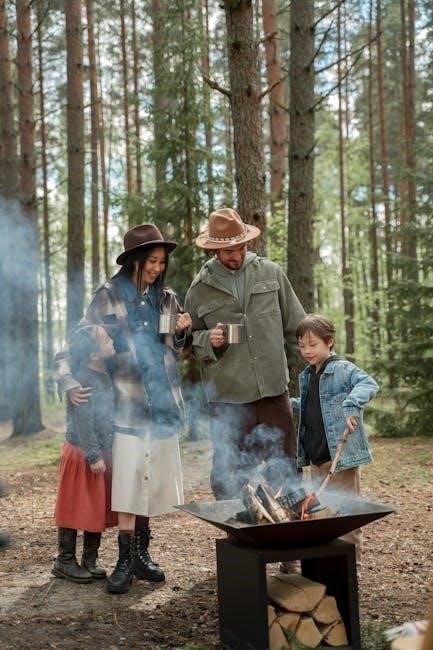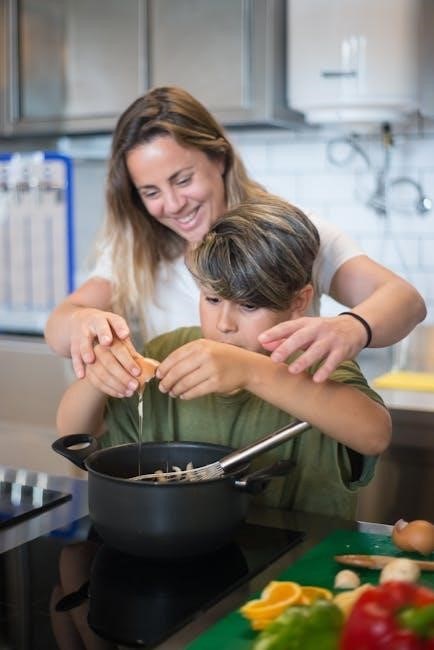Welcome to the Sleepaway Camp 2 Parents Guide! This guide is designed to help you prepare your child for an exciting and safe summer camp experience.
What is Sleepaway Camp 2?
Sleepaway Camp 2 is a comprehensive summer camp program designed to provide children with an immersive outdoor experience, fostering personal growth, friendship, and adventure. Typically lasting several weeks, the camp offers a variety of activities such as team sports, arts, crafts, and nature exploration. It caters to children of different age groups, ensuring age-appropriate engagement and development. The camp emphasizes building independence, resilience, and social skills through structured programs and collaborative efforts between campers and staff. With experienced counselors and a focus on safety, Sleepaway Camp 2 aims to create a nurturing environment where children can thrive emotionally and physically. This guide will help parents understand the camp’s structure, policies, and how to best support their child’s experience.
Why Choose Sleepaway Camp 2 for Your Child?
Sleepaway Camp 2 offers a unique blend of adventure, education, and personal growth, making it an ideal choice for parents seeking a transformative experience for their child. The camp provides a safe and supportive environment where children can develop independence, self-confidence, and teamwork skills. With a focus on age-appropriate activities, Sleepaway Camp 2 ensures that every camper engages in meaningful and enjoyable experiences. The camp’s experienced staff, comprehensive safety protocols, and commitment to fostering friendships and memories make it a standout option. By choosing Sleepaway Camp 2, parents can trust that their child will have a fun and enriching summer that promotes emotional and physical development. This guide will help you understand how the camp supports your child’s growth and well-being.
Preparation for Sleepaway Camp 2
Preparing your child for Sleepaway Camp 2 involves packing essentials, discussing expectations, and addressing emotional needs to ensure a smooth transition. This section guides you through it.
Essential Items to Pack for Your Child
When packing for Sleepaway Camp 2, include clothing for varying weather, toiletries, a sleeping bag, and personal items like a flashlight and stationery. Don’t forget sunscreen and a reusable water bottle.
Helping Your Child Prepare Emotionally
To prepare your child emotionally for Sleepaway Camp 2, start by discussing their feelings and reassuring them it’s okay to feel nervous. Encourage open conversations about expectations and concerns. Teach coping skills, like deep breathing or journaling, to manage homesickness. Role-play camp scenarios to build confidence. Stay positive and express excitement about their adventure, which helps reduce anxiety. Avoid promising to pick them up if they’re unhappy, as this can worsen homesickness. Foster trust in the camp staff and their ability to support your child. By fostering resilience and independence, you’ll help your child transition smoothly into camp life and thrive in this new environment.
Communication with the Camp
Maintain open communication with the camp through emails or designated portals. Stay updated on your child’s experiences and view camper photos. Feel confident in the camp’s commitment to keeping you informed.
Staying in Touch with Your Child
Staying in touch with your child while they’re at camp can be both reassuring and exciting for parents; Many camps offer one-way email services or online portals where you can send messages and view photos of camp activities. These platforms allow you to stay connected without disrupting your child’s camp experience. Some camps also provide scheduled updates or newsletters to keep parents informed. Additionally, understanding the camp’s communication policy beforehand ensures you know what to expect regarding updates and how often you’ll hear from your child. This balance helps maintain your peace of mind while giving your child the space to grow independently.
Understanding the Camp’s Communication Policy
Understanding the camp’s communication policy is essential for a smooth experience for both parents and campers. Most camps offer one-way email services, allowing parents to send messages while campers can reply. Additionally, many camps provide access to camper photos through secure online portals, giving parents a glimpse into daily activities. Some camps may have specific policies regarding phone calls or care packages. It’s important to review and understand these guidelines beforehand to ensure you’re aligned with the camp’s approach. Clear communication policies help maintain a balance between staying connected and allowing your child to fully engage in camp life. Always verify the details with the camp administration to avoid misunderstandings and ensure a positive experience for everyone involved.
Safety and Security at Sleepaway Camp 2
Sleepaway Camp 2 prioritizes camper safety with trained staff, secure facilities, and clear emergency protocols. We ensure a safe, supportive environment for all campers during their stay.
Staff Screening and Qualifications
Our camp staff undergo rigorous background checks and training to ensure your child’s safety. All counselors and leaders are certified in first aid and CPR, with many holding specialized qualifications in their activity areas. We prioritize hiring experienced individuals who are passionate about working with children. Staff training includes child development, conflict resolution, and emergency preparedness, ensuring they are equipped to handle any situation. Additionally, we maintain a low camper-to-staff ratio to provide personalized attention and care. Parents can trust that our team is dedicated to creating a secure and nurturing environment for all campers. Our commitment to excellence in staff qualifications and training sets us apart, ensuring a safe and enjoyable experience for your child.
Emergency Procedures and Risk Management
Sleepaway Camp 2 prioritizes camper safety with comprehensive emergency procedures in place. Our staff is trained to handle situations such as injuries, natural disasters, and medical emergencies. Regular safety drills ensure preparedness, and campers are educated on emergency protocols. A detailed risk management plan assesses potential hazards, ensuring activities are conducted safely. Parents can trust that we maintain open communication regarding any incidents. Our team collaborates with local authorities to ensure rapid response capabilities. By addressing risks proactively, we create a secure environment for your child to thrive. Transparency and safety are at the forefront of our operations, giving you peace of mind while your child enjoys their camp experience.

Homesickness and Adjustment
Homesickness is a natural part of camp life, but with preparation and support, your child can thrive. Open conversations about feelings and coping strategies help ease transitions. Camp staff are trained to assist with emotional adjustments, fostering a supportive environment for all campers. Encourage your child to engage in activities and build friendships, knowing it’s okay to feel homesick. This experience is a valuable step in their growth and independence.
Preventing and Managing Homesickness
Preventing homesickness begins at home. Talk openly with your child about their feelings and listen to their concerns without dismissing them. Encourage them to express emotions and reassure them that it’s normal to feel homesick. Equip your child with coping strategies, such as focusing on camp activities, making new friends, and staying positive. Remind them of past experiences where they successfully navigated new environments. Packing a small comfort item, like a favorite blanket or photo, can provide reassurance. Camp staff are trained to identify and support homesick campers, so trust their expertise. Stay positive and avoid promises to pick them up early, as this can worsen anxiety. Foster independence and growth by allowing them to navigate challenges on their own.
Supporting Your Child’s Transition to Camp Life
Supporting your child’s transition to camp life involves fostering excitement and confidence. Discuss the camp’s daily routine, activities, and rules to help them visualize their experience. Encourage them to ask questions and express any fears or worries. Role-playing scenarios, like introducing themselves to peers or seeking help from counselors, can build their confidence. Emphasize the importance of trying new things and making friends. Share your own positive experiences or stories of others who thrived at camp. Remind them that it’s okay to feel nervous but that growth comes from stepping out of their comfort zone. By fostering a positive mindset, you help your child embrace the camp experience and make lasting memories. Stay supportive and trusting of the camp’s ability to provide a nurturing environment.
Parental Involvement
Parental involvement is key to a successful camp experience. By collaborating with camp staff and maintaining open communication, parents can ensure their child’s needs are met and supported.
How Parents Can Support the Camp Experience
Parents play a vital role in supporting their child’s camp experience. By staying informed and engaged, you can help your child make the most of their time at Sleepaway Camp 2. Encourage open communication with camp staff to ensure your child’s needs are met. Provide emotional support by discussing coping skills and reassuring your child of the positive aspects of camp life. Additionally, respecting the camp’s policies and procedures helps maintain a structured environment for all campers. Your involvement fosters a sense of security and confidence, allowing your child to thrive socially, emotionally, and physically during their camp adventure.
Collaboration Between Parents and Camp Staff
Collaboration between parents and camp staff is essential for ensuring a positive and successful camp experience for your child. Open communication and mutual respect form the foundation of this partnership. Parents should feel comfortable sharing their child’s needs, preferences, and any concerns with the camp staff. Similarly, camp staff are committed to keeping parents informed about their child’s progress and well-being. By working together, parents and staff can create a supportive environment that fosters growth, safety, and happiness for all campers. This teamwork ensures that your child receives the care and attention they need to thrive during their time at Sleepaway Camp 2;

Health and Wellness at Camp
Sleepaway Camp 2 prioritizes your child’s health and wellness, ensuring access to trained medical staff, nutritious meals, and a clean environment to support their physical and emotional well-being.
Medical Care and Health Policies
Sleepaway Camp 2 ensures your child’s health and safety with trained medical staff and on-site facilities. Camp nurses monitor wellness, handle minor injuries, and manage medications. Policies include strict hygiene practices, regular health checks, and emergency preparedness. All campers must submit detailed medical forms before arrival to address allergies, sensitivities, and chronic conditions. Staff are certified in first aid and CPR, and local hospitals are accessible for critical situations. Communication with parents is maintained regarding any health concerns. The camp also enforces protocols for preventing and managing illnesses, ensuring a safe environment for all participants. By prioritizing health, Sleepaway Camp 2 helps your child focus on growth and fun.
Handling Special Dietary Needs and Allergies
Sleepaway Camp 2 accommodates special dietary needs and allergies with care and attention. Parents must provide detailed information about their child’s requirements on health forms. The camp offers tailored meal plans, ensuring all meals are safe and nutritious. Trained staff oversee food preparation, avoiding cross-contamination for those with severe allergies. Snacks and alternatives are always available. Communication between parents, camp staff, and chefs is maintained to ensure your child’s needs are met. The camp’s commitment to inclusivity ensures every camper can enjoy meals without worry, fostering a positive and supportive environment. This approach helps your child thrive physically and emotionally during their stay.

Understanding Camp Life
Sleepaway Camp 2 offers a structured yet fun environment, fostering growth through activities, teamwork, and community bonding. Campers engage in daily routines, including meals, games, and reflection, creating lasting memories.
Daily Routine and Activities
At Sleepaway Camp 2, a typical day begins with a morning wake-up call, followed by breakfast and a group meeting to outline the day’s schedule. Campers participate in a mix of structured activities, such as team sports, arts and crafts, and outdoor adventures, designed to promote teamwork, creativity, and physical fitness. Lunch is served midday, with time for rest or relaxation. The afternoon often includes swimming, hiking, or educational programs, while evenings feature campfires, skits, or reflective discussions. These activities foster camaraderie and personal growth. Trained staff supervise all events, ensuring safety and engagement. The daily routine is balanced to provide fun, learning, and downtime, helping campers build confidence and lifelong friendships.
Behavioral Expectations and Rules
Sleepaway Camp 2 emphasizes respect, responsibility, and kindness among all campers and staff. Clear rules are in place to ensure a safe and positive environment. Campers are expected to respect one another, listen to staff instructions, and participate fully in activities. Rules include no bullying, no unauthorized departures from camp areas, and adherence to safety guidelines. Misbehavior is addressed through calm discussions with counselors, focusing on understanding and resolving issues. In serious cases, parents may be involved to ensure the camper’s success. These expectations foster a supportive community where everyone can thrive. By following these guidelines, campers learn valuable life skills like cooperation and self-discipline, helping them grow into confident individuals.

Final Tips for Parents
Trust the camp’s experienced staff and let your child embrace new experiences. Stay positive, offer support, and celebrate their growth throughout the camp journey.
Trust the Process and Let Your Child Grow
Trusting the camp process allows your child to thrive in a supportive environment. Experienced staff are dedicated to fostering growth, independence, and confidence. Encourage your child to embrace new challenges and make lifelong friends. By letting go of worries, you enable them to discover their potential and develop resilience. Celebrate their journey and trust that the camp is a safe space for exploration and learning. Your support and positivity play a crucial role in their successful camp experience, helping them return home with unforgettable memories and personal growth.
Staying Positive and Supportive
Maintaining a positive and supportive attitude is crucial for your child’s camp experience. Encourage open communication and express confidence in their ability to thrive. Avoid overwhelming your child with worries, as this can create unnecessary anxiety. Instead, focus on fostering excitement and curiosity about the adventures ahead. Stay informed about camp activities and policies, but trust the staff to provide a safe and nurturing environment. If concerns arise, address them calmly and constructively. Your positivity and support will help your child feel secure and empowered, allowing them to fully embrace the opportunities camp offers. By staying optimistic, you contribute to a successful and memorable experience for your child.
